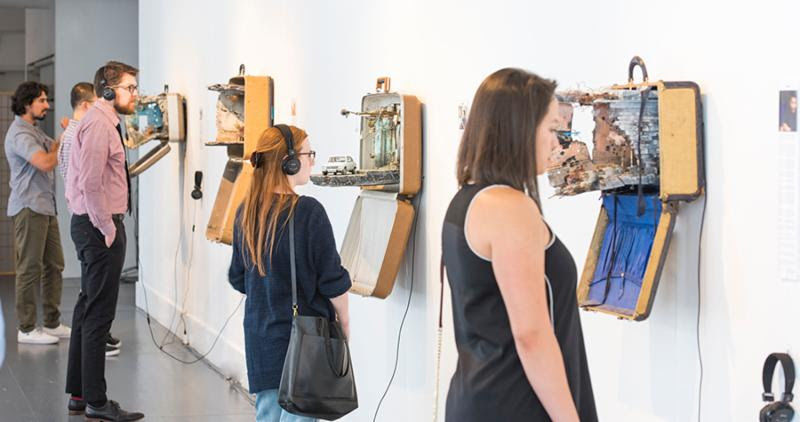Iowa State alumnus brings the refugee story to Ames through art
Image by Rodney Nelson and courtesy of the artist.
UNPACKED: Refugee Baggage installation by Mohamad Hafez.
September 3, 2018
The stories of refugees from a variety of different countries are coming to Ames, Iowa.
Mohamad Hafez, Iowa State alumnus and nationally acclaimed Syrian artist, will be returning to Ames bringing his multimedia exhibition “UNPACKED: Refugee Baggage” to the Christian Petersen Art Museum from Sept. 4 through Oct. 19.
From 4:30 to 6 p.m. on Tuesday, an exhibition opening reception will be hosted where Hafez will speak about his art.
For the exhibit, Hafez collaborated with Ahmed Badr, writer and former Iraqi refugee, to create a collection of refugee stories represented in an audio and visual format.
“We’re trying to raise awareness, and we’re trying to encourage people to learn more about each other, and discover the similarities and the common denominator between them and some of these refugee families,” Hafez said.
The exhibition features a visual component of suitcases, which hold a visual story inside of them, often using small objects to paint a picture of the audio component of the pieces.
It “re-creates rooms, homes, buildings and landscapes that have suffered the ravages of war,” according to the Unpacked: Refugee Baggage website.
The audio component features individual refugees sharing their stories in their own words of their experiences escaping the same rooms or buildings as the suitcases.
“The goal is when you put on the headset of each suitcase and you’re hearing that sixty, to ninety to one hundred and twenty second clip of that refugee talking to you back in English, that you would leave thinking, ‘Wait a minute, this family is not very different from me, or my family, or my siblings’ and ‘I can relate to their experience somehow,’” Hafez said.
Hafez hopes this message can transcend to those of many different mindsets, even those who may not share his personal beliefs, and change the mindset of someone who holds negative viewpoints to immigrants, Muslims or refugees through the humanization of the exhibition, and help them see the commonality between themselves and those people whose stories are featured.
“The Bush-era National Security Entry-Exit Registration System held up Hafez’s visa for 18 months and made it so he wouldn’t return to Syria for eight years,” according to a press release from University Museums at Iowa State University.
“When the Syrian Civil War began, he coped with the pain from his homeland’s destruction by modeling its devastation as high-fidelity sculptures. Several years into the conflict, friends insisted he reveal this work to the world.”
Hafez said they tried to select a range of backgrounds, nationalities and religions for the exhibition.
“While the interest in the media has been focusing on Syrian or Iraqi refugees, we tried to give a holistic image, so we talked to people from Congo, Sudan, Afghanistan and Iran, because the refugee crisis is really a global crisis that affects many, many countries and many nationalities,” Hafez said.
But what they were not trying to do, Hafez said, is romanticize the label refugee.
“[We were] not trying to paint a rosy picture, but rather more of a realistic, holistic picture. If you look at the facts and you look at the numbers this is an issue that affects millions of people, so it’s not fair to paint millions of people with one wide brush stroke,” Hafez said.
For Hafez, his process allowed him to let the story build itself — each story detailed in a certain way, he said.
“Originally what I do is I listen. I sit in on these interviews, and we interviewed these families for a good four, five or six hours, sometimes, at a time, and each story is very different,” Hafez said.
More information can be found on their website www.unpackedrefugee.com, ambadr.com/unpacked/ and mohamadhafez.com.
















